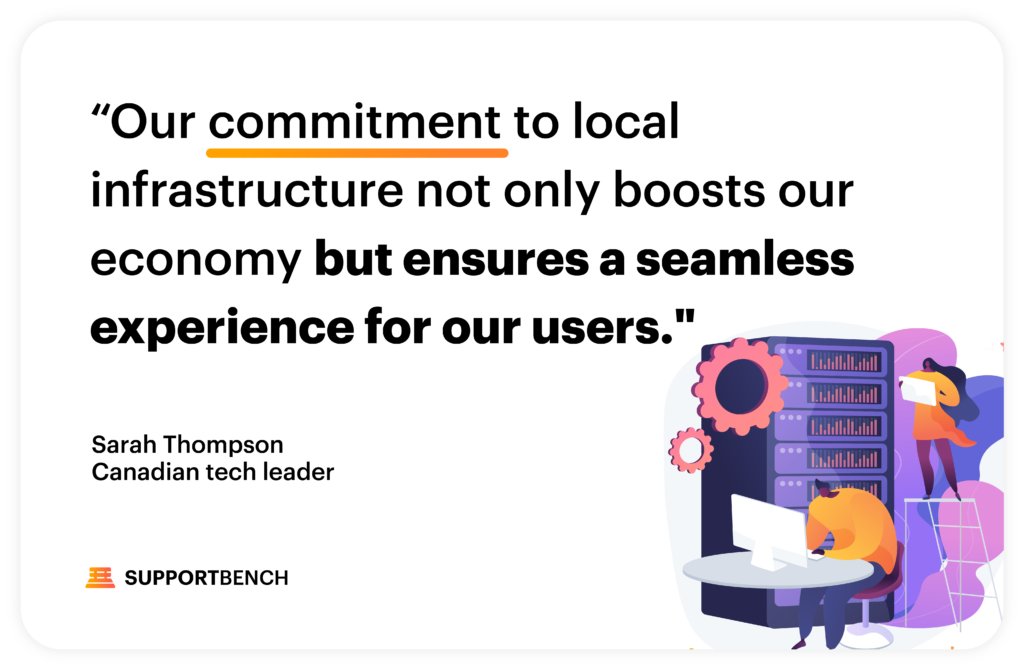In the era of digital transformation, where the emphasis on data privacy and security is paramount, Canadian businesses have been at a crossroads. Should they rely on foreign data centers to handle their customer data, or should they opt for Canadian-based solutions? The answer, especially for enterprises dedicated to providing unparalleled customer support and maintaining the highest level of security, is clear: Canadian companies need, and indeed deserve a Canadian data center!
But why a Canadian Data Center?

Strict Data Privacy Laws: Canada is renowned for its strict data privacy laws. According to the Privacy Commissioner of Canada, businesses are required to ensure that personal data is protected, regardless of where it is stored. Having a Canadian data center ensures companies remain compliant with the Personal Information Protection and Electronic Documents Act (PIPEDA) and other national data protection regulations.
Also, an argument can certainly be made for improved performance. You might not think so, but geographical proximity matters. A Canadian data center offers faster data transfer rates for Canadian businesses, translating into better performance and more efficient customer support.
Lest we never forget national pride. Supporting Canadian infrastructure contributes to the nation’s economy and reinforces trust among local consumers.
“Our commitment to local infrastructure not only boosts our economy but ensures a seamless experience for our users,” remarks Sarah Thompson, a Canadian tech leader.
Let’s discuss six transformative support trends for Canadian Enterprises:
Embrace AI-driven Customer Insights
With the influx of data, AI has become an invaluable tool in deciphering complex customer metrics, from sentiment analysis to predictive behavior. Consider how a telecom company could analyze customer interactions to predict when a user might switch services. By identifying these patterns early, support teams can intervene proactively. You would simply start by integrating AI tools into your existing CRM system. Platforms like Supportbench have already incorporated AI functionalities, like sentiment analysis and intent detection, which can provide real-time insights.
Personalized Customer Journeys:
Personalization is no longer a luxury but a necessity. Tailoring experiences based on customer data can dramatically enhance satisfaction rates. In fact, an e-commerce platform could suggest products based on a user’s browsing history and previous purchases. You could use data analytics tools to segment your customer base and from there, craft support strategies catering to each segment’s unique needs and preferences.
Empower with Self-Service Portals:
Today’s customers value autonomy. By providing self-service options, businesses empower customers while simultaneously reducing support ticket volumes. So, software-as-a-service (SaaS) platforms offering a knowledge base where users can find answers without reaching out to support directly. So introducing a comprehensive knowledge base, and ensuring it’s easily accessible, platforms like Supportbench offer seamless integration of such services.
Implement Proactive Support:
Instead of waiting for issues to arise, modern support teams anticipate problems and offer solutions before they escalate. For instance, a hosting service detecting potential server issues and alerting customers with mitigation steps. So you would simply need to invest in monitoring tools that provide real-time data on product performance and then use this data to anticipate common customer issues.
Integrate Multichannel Support:
Customers interact with businesses across multiple channels. Offering consistent support across all these touchpoints is crucial. A user might start a query on chat, move to email, and then require a phone conversation. The transition between these channels should be seamless. To facilitate this, opt for support solutions that offer multichannel integration. This ensures a unified view of the customer, regardless of how they reach out.
Feedback-Driven Iteration:
The best insights often come directly from customers. Regularly collecting and acting on feedback can significantly improve support services. And a software company making updates based on user feedback is ensuring the product aligns with actual user needs. Incorporating regular NPS or CES surveys, like those offered by Supportbench, analyze this feedback and iteratively refine your support strategies.
Supportbench’s Approach
In the landscape of customer support, understanding the needs of Canadian enterprises is essential. Platforms like Supportbench are not merely providing support tools but are engineering comprehensive solutions tailor-made for the intricacies of Canadian businesses. From AI-driven insights to multichannel support, the emphasis is on providing a seamless experience, driven by data and ensuring optimal security. The choice of a Canadian data center underscores this commitment, ensuring Canadian enterprises are equipped with the best tools in their pursuit of excellence.
Consequences of forgoing a Canadian data center:

It’s crucial to understand the potential consequences a Canadian company might face if it decides to forgo local data storage:
Regulatory Complications:
As mentioned earlier, Canada is known for its strict data privacy laws like PIPEDA. If Canadian companies decide to store their data outside the country, they run the risk of potential non-compliance with national regulations. This could lead to significant legal and financial penalties. Besides, navigating the web of international data laws can be complicated and costly.
Data Sovereignty Risks:
Storing data abroad means being subject to the data laws of that particular country. In cases where international relations become strained, data can become a bargaining chip or be seized, putting the company’s operations, reputation, and customer trust in jeopardy.
Latency and Performance Issues:
Using data centers located far from the primary user base can lead to latency issues. Even milliseconds of delay can affect user experience significantly. In sectors where real-time data access is crucial, like financial services or healthcare, these delays can have detrimental effects on service quality and customer satisfaction.
Potential Economic Consequences:
By opting for foreign data centers, Canadian companies indirectly support the growth of foreign economies rather than reinvesting in their homeland. Over time, this can result in a significant economic drain, reducing the potential for job creation and infrastructural development within Canada.
Reduced Trust Among Local Consumers:
Canadian consumers are becoming increasingly conscious about where and how their data is stored. Trust is paramount in a digital age. Companies that store data locally can market themselves as champions of national data security, which can be a significant competitive advantage.
Increased Costs:
While it might seem counterintuitive, sometimes storing data abroad can be more expensive in the long run. Consider the costs of navigating foreign data regulations, potential fines for non-compliance, or the need for additional encryption and security measures when transmitting data across borders.
Complications in Data Recovery:
In cases of data breaches or system failures, the recovery process from an international data center can be more time-consuming and cumbersome. Time zones, differing work cultures, and language barriers can all play a role in slowing down the recovery, thus extending downtime and potentially leading to further financial and reputational damage.
A Local Solution for a Global Age
In conclusion, while globalized solutions offer the allure of scale and sometimes initial cost savings, Canadian enterprises must look at the broader picture. The potential consequences of not leveraging a Canadian data center can outweigh the perceived benefits, affecting not only the company’s bottom line but also its reputation, customer trust, and overall operational efficiency.
By understanding these risks and adopting solutions tailored to the Canadian landscape, businesses can ensure they remain agile, secure, and trusted in an increasingly digital and interconnected world. Platforms like Supportbench, which prioritize local infrastructure, demonstrate a forward-thinking approach, aligning technological solutions with the unique needs and challenges faced by Canadian enterprises.















